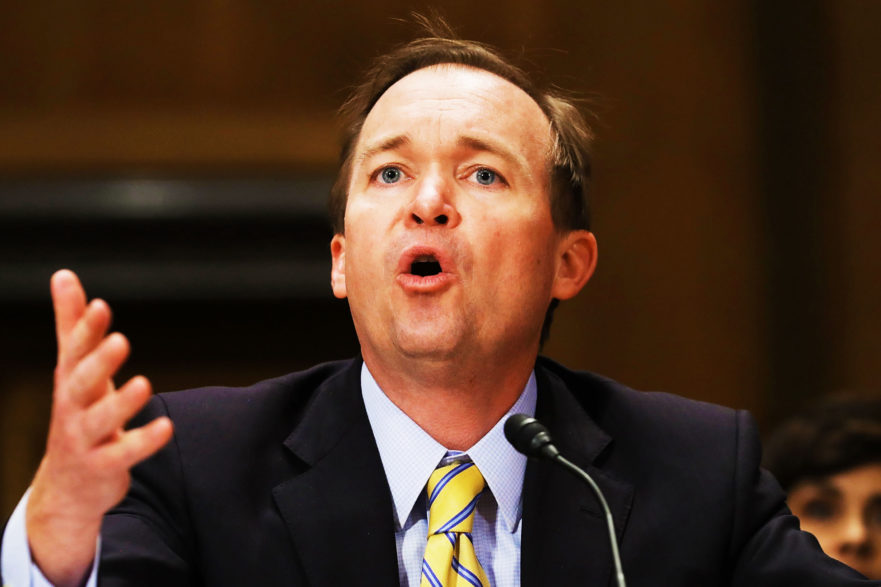Then-Rep. Mick Mulvaney (R-S.C.) testifies before the Senate in January 2017 during his confirmation hearing to be the director of the Office of Management and Budget. Photo by Chip Somodevilla/Getty Images.
Trump’s controversial pick to head the Consumer Financial Protection Bureau (CFPB), Mick Mulvaney, received some of his most generous political contributions as a congressional candidate and a congressman from financial groups including Bank of America, the American Bankers Association, and the Credit Union Association, according to data maintained by the Center for Responsive Politics. Over the course of Mulvaney’s four congressional runs, from 2009 through 2016, Bank of America, the American Bankers Association, and the Credit Union Association gave $20,951, $32,500, and $30,250 to Mulvaney, respectively.
The CFPB was established by the Dodd-Frank Act in response to the financial crisis of 2007–2008 to oversee various financial institutions including banks, credit unions, and payday loan companies—each of which contributed campaign cash to Mulvaney.
Mulvaney’s appointment this weekend triggered a showdown with the CFPB, which already had an interim director appointed by outgoing director Richard Cordray, who is expected to run for governor in Ohio.
Mulvaney is considered a controversial choice not just because he would continue to serve as director of Trump’s Office of Management and Budget, but because of his long record opposing CFPB measures and the agency’s existence.
Prior to his OMB position, Mulvaney represented South Carolina’s fifth congressional district. Some of his top donors during his House races were institutions he would now regulate as CFPB director.
In 2016, Grupo Salinas, which owns the largest payday loan chain in the country, Advance America, contributed $5,000 to Mulvaney’s campaign. Last month, CFPB introduced new, strict regulations on payday loan practices, prompting Advance America’s spokesperson to call on Trump to “intercede.”
During the 2016 election cycle, JPMorgan Chase & Co. and the Mortgage Bankers Association ranked among the top contributors to Mulvaney’s Campaign Committee, donating $9,200 and $9,000, respectively. In March of 2013, Albert Hegyi, chairman, president, and CEO of 1st Financial Bank USA, contributed $2,600 to Mulvaney, then the maximum amount permitted. The CFPB has oversight over commercial lending institutions.
Mulvaney also has connections to credit unions under CFPB oversight, beyond the $30,250 given to him by the Credit Union Association. In 2012, Founders Federal Credit Union was a top contributor to Mulvaney, giving him $5,000. In 2011, the Founders FCU’s president gave Mulvaney $2,500—the maximum amount allowed at the time—and another $1,000 in 2013.
According to a post-travel disclosure form, Mulvaney and his wife traveled to meet with Founders Federal’s board of directors and senior management at a West Virginia spa and golf resort in October of 2011 to discuss “issues and regulations regarding financial services industry and credit unions.” The trip was paid for by Founders Federal. According to Mulvaney’s financial disclosure report to Congress, he also keeps a small sum of money at Founders Federal.
TYT previously reported that the White House rejected the possibility of a conflict of interest regarding Mulvaney’s work as OMB director on the tax bill. After TYT learned that Mulvaney’s brother is a portfolio manager helping oversee the investments of Apple Inc., the largest beneficiary of the GOP’s proposed tax cuts, a White House spokesperson responded that all Americans will benefit from the tax bill, so “we are all ‘conflicted.’”


